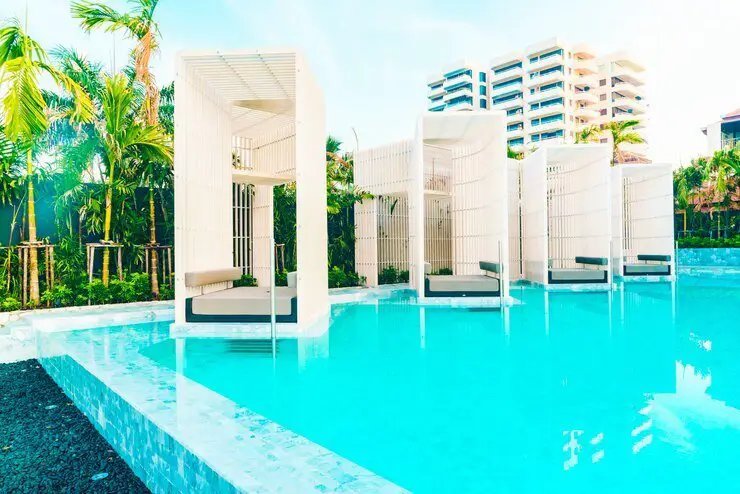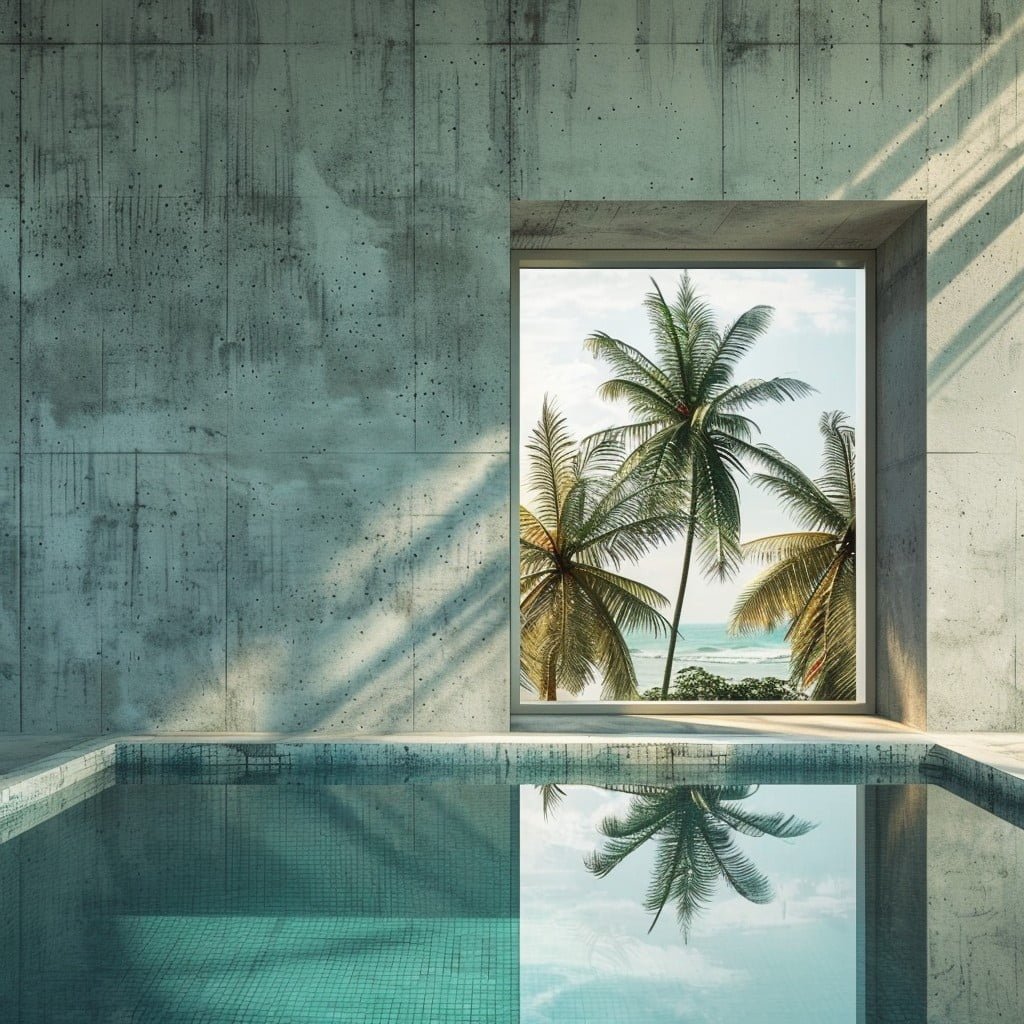Table of Contents
Concrete Swimming Pool
A concrete swimming pool is a type of pool that is constructed using a reinforced steel framework, which is then filled with a mixture of concrete and water. This type of pool is known for its durability, strength and versatility, allowing for a wide range of custom shapes, sizes and finishes. Concrete pools are typically built in-ground and are considered a premium option due to their longevity and the level of customization they offer. Source

Important Features of Concrete Swimming Pools
1. STRUCTURE AND CONSTRUCTION:
Concrete pools are built by first excavating the pool area and then installing a steel framework, which forms the structure of the pool. The steel is tied together to form a grid that reinforces the concrete.
Once the framework is in place, the concrete and water mixture is either shot through a hose (in the case of gunite) or poured into a wooden form (in the case of poured concrete). The concrete is then smoothed and shaped to the desired design.
2. Durability and Longevity of Concrete Swimming Pool:
Concrete pools are known for their durability and longevity. When properly constructed and maintained, a concrete pool can last for decades.
The robust nature of concrete allows it to withstand a variety of environmental conditions, making it a suitable choice for all seasons.
3. Design Versatility:
A major advantage of concrete pools is their ability to be custom designed to fit any shape, size or depth. This flexibility allows home owners to create unique, personalized pool designs that can include features such as infinity edges, tanning ledges, custom steps, and integrated spas.
Concrete pools can be finished with a variety of materials, including plaster, tiles, pebbles, or quartz, providing a wide range of aesthetic options.
4.Level Options:
Concrete pool surfaces can be finished with a variety of materials, each offering a different texture, color, and level of durability. Common complements include:
- Plaster: A traditional and cost-effective finish that provides a smooth surface. It can be colored to match the design of the pool.
- Pebbles: A more durable and textured finish made of small, polished stones. Stone surfaces are resistant to staining and chemical damage.
- Tile:Offers the highest level of customization, with options ranging from small mosaic tiles to large ceramic or glass tiles. Tiles are durable, easy to clean and highly resistant to chemical damage.
- Quartz: A combination of crushed quartz and plaster, provides a smooth and durable surface with a sparkling effect.
5. Maintenance of Concrete Swimming Pool:
Concrete pools require more maintenance than other types of pools, such as vinyl liner or fiberglass pools. The porous nature of concrete makes it susceptible to algae growth, so regular cleaning and chemical balancing are essential.
Surface finishes, especially plaster, may need to be re-applied or repaired from time to time, as it may become rough or develop cracks over time.
6. Installation Process:
Construction of a concrete pool is a complex and time-consuming process, usually taking several weeks to several months depending on the design and site conditions. These stages include excavation, steel framework installation, concrete application, curing and finishing.
Curing is an important part of the process, where the concrete must be kept moist for several days to achieve maximum strength.
7. Cost of concrete Swimming Pool:
Concrete pools are more expensive to install than vinyl liner or fiberglass pools. The price is affected by factors such as the size of the pool, the complexity of the design, and the choice of finishing materials.
Although the initial investment is high, the long-term durability and customization options make concrete pools a preferred choice for those looking for a high-end, personalized pool.
8. Advantages and Disadvantages of Concrete Swimming Pool:
Advantages:
- Customization: Unlimited design possibilities, allowing for highly personalized pool shapes, sizes and features.
- Durability: Concrete pools are extremely durable and can last for decades with proper maintenance.
- Superior Aesthetics:The ability to choose from a variety of finishes gives concrete pools a luxurious and classy look.
Disadvantages:
- Cost: Initial construction costs are high compared to other types of pools.
- Maintenance:More frequent maintenance is required to prevent algae growth and maintain appearance, including resurfacing and cleaning.
- Long installation time: The construction process is long and complicated, leading to a long timeline before the pool is ready for use.
Detail Swimming Pool Cost
Here’s a detailed table that focuses on the various aspects of concrete pools, including cost, advantages, disadvantages, and other key factors:
| Aspect | Concrete Pool |
|---|---|
| Initial Cost | $50,000 to $100,000+ depending on size, design, and features |
| Long-Term Costs | Regular maintenance and resurfacing every 10-15 years ($10,000 to $20,000) |
| Construction Time | 8 to 12 weeks or more |
| Durability | Very high, can last 50 years or more with proper maintenance |
| Maintenance | Requires regular cleaning, chemical balancing, and periodic resurfacing |
| Customization | Unlimited customization in shape, size, and features |
| Surface Finishes | Plaster, tile, pebble, quartz |
| Aesthetic Options | High-end, luxurious appearance with various finish options |
| Environmental Impact | High (energy-intensive construction, significant use of chemicals) |
| Energy Efficiency | Requires more heating due to porous surface, less energy-efficient |
| Resale Value | High (luxury and customizability add significant value to property) |
| Advantages | – Unlimited design possibilities |
| – Extremely durable and long-lasting | |
| – High-end finishes enhance aesthetic appeal | |
| – Can be tailored to fit any shape, size, or depth | |
| – Can integrate custom features like infinity edges, spas, and waterfalls | |
| Disadvantages | – Highest initial cost among pool types |
| – Longer installation time | |
| – Requires regular and more intensive maintenance | |
| – Periodic resurfacing needed | |
| – Higher environmental impact | |
| Common Issues | – Algae growth due to porous surface |
| – Potential for cracks or surface wear over time | |
| Best For | Homeowners seeking a highly customizable, luxury pool with long-term durability |
Key Aspects Explained
- Initial Cost:Concrete pools are the most expensive to build, often starting at $50,000 and increasing based on the complexity of the design, size, and features.
- Long-Term Costs: Although concrete pools are durable, they require periodic resurfacing and ongoing maintenance, leading to high long-term costs.
- Construction Time: The process of constructing a concrete pool is extensive, often taking 8 to 12 weeks or more, depending on the scope of the project.
- Durability:Concrete pools are known for their exceptional durability, often lasting 50 years or more if properly maintained.
- Maintenance:Due to the porous nature of concrete, these pools require regular cleaning to prevent algae growth, along with chemical balancing to maintain water quality. Resurfacing is necessary every 10 to 15 years.
- Customization:Concrete pools offer the highest level of customization, allowing for unique shapes, sizes and features that can be tailored to the home owner’s vision.
- Surface Finishes and Aesthetics: Finish options for concrete pools include plaster, tile, stone and quartz, each offering different textures and visual effects. These finishes contribute to the luxurious appearance of the pool.
- Environmental Impact:Concrete pools have a high environmental impact due to the energy-intensive construction process and significant use of chemicals for maintenance.
- Energy Efficiency: Concrete pools are less energy efficient than fiber glass pools, as porous surfaces can lead to heat loss, requiring more frequent heating.
- Resale Value: Despite the high cost and maintenance, concrete pools add substantial resale value to a property due to their longevity, customization and luxury appeal.
- Benefits:Major benefits include unlimited design possibilities, extreme durability, high-end finishes, and the ability to integrate custom features such as infinity edges, grottoes, and spas.
- Disadvantages:The main disadvantages are higher initial cost, longer installation time, more demanding maintenance., need for periodic resurfacing and high environmental impact.
- Common Problems: Algae growth and the possibility of cracks or surface deterioration over time are common problems with concrete pools.
- Best for:Concrete pools are best suited for home owners seeking a highly customized, luxury pool that offers long-term durability and is tailored to their specific needs and preferences. .
- This table provides a detailed overview of all aspects of a concrete pool, helping you understand their pros, cons, and other important factors in the decision-making process.
Conclusion
Concrete swimming pools are a great choice for homeowners who want a durable, customizable, and aesthetically pleasing pool. While they come with high costs and maintenance requirements, the flexibility in design and longevity of concrete pools make them a worthwhile investment for those looking for a luxury pool that is tailored to their specific tastes and needs. can go Whether choosing a simple rectangular pool or an intricate free form design with custom features, a concrete pool can provide a stunning and long-lasting addition to any property. Read More


“Fantastic website! I love the user-friendly layout and innovative features. It’s inspiring to see such creativity in web design. As someone from https://pools-now.com/ truly appreciate platforms that enhance the online experience. Keep up the amazing work!”